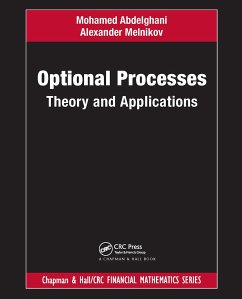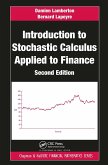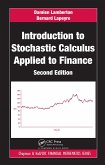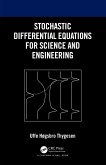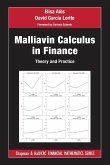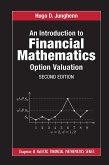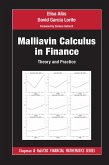It is well-known that modern stochastic calculus has been exhaustively developed under usual conditions. Despite such a well-developed theory, there is evidence to suggest that these very convenient technical conditions cannot necessarily be fulfilled in real-world applications.
Optional Processes: Theory and Applications seeks to delve into the existing theory, new developments and applications of optional processes on "unusual" probability spaces. The development of stochastic calculus of optional processes marks the beginning of a new and more general form of stochastic analysis.
This book aims to provide an accessible, comprehensive and up-to-date exposition of optional processes and their numerous properties. Furthermore, the book presents not only current theory of optional processes, but it also contains a spectrum of applications to stochastic differential equations, filtering theory and mathematical finance.
Features
Suitable for graduate students and researchers in mathematical finance, actuarial science, applied mathematics and related areas
Compiles almost all essential results on the calculus of optional processes in unusual probability spaces
Contains many advanced analytical results for stochastic differential equations and statistics pertaining to the calculus of optional processes
Develops new methods in finance based on optional processes such as a new portfolio theory, defaultable claim pricing mechanism, etc.
Optional Processes: Theory and Applications seeks to delve into the existing theory, new developments and applications of optional processes on "unusual" probability spaces. The development of stochastic calculus of optional processes marks the beginning of a new and more general form of stochastic analysis.
This book aims to provide an accessible, comprehensive and up-to-date exposition of optional processes and their numerous properties. Furthermore, the book presents not only current theory of optional processes, but it also contains a spectrum of applications to stochastic differential equations, filtering theory and mathematical finance.
Features
Suitable for graduate students and researchers in mathematical finance, actuarial science, applied mathematics and related areas
Compiles almost all essential results on the calculus of optional processes in unusual probability spaces
Contains many advanced analytical results for stochastic differential equations and statistics pertaining to the calculus of optional processes
Develops new methods in finance based on optional processes such as a new portfolio theory, defaultable claim pricing mechanism, etc.
"Modern stochastics is usually identified with stochastic analysis, a field in mathematics that is well-developed under "usual conditions". Hence, a variety of results of this theory and its applications are also restricted by these technical conditions. Many examples from theory and applications call for further extensions of stochastic analysis. Optional Processes: Theory and Applications is first attempt of such natural extension.
The authors provide an excellent treatment of papers written in the 1970s and 1980s by Dellacherie, Doob, Galtchouk, Lepingle, and Lenglart among others. Moreover, the authors develop this topic in a comprehensive manner, and while doing so offer beautiful applications to the fields of mathematical finance and filtering theory. This book will be extremely useful for experts in the area of stochastic analysis, mathematical finance, and related fields."
-Svetlozar Rachev, Texas Tech University
"The usual analysis of stochastic processes in continuous time is developed in a framework of a filtered probability space satisfying the 'usual conditions'. That is, the flow of information modeled by the filtration is assumed to be right continuous. Situations arise where this condition is not satisfied. This important book develops a theory of stochastic processes where 'unusual conditions' are assumed to hold. These have applications in quantitative finance and elsewhere."
-Robert J. Elliott, Faculty Professor and Emeritus Professor at University of Calgary and Research Professor at University of South Australia
The authors provide an excellent treatment of papers written in the 1970s and 1980s by Dellacherie, Doob, Galtchouk, Lepingle, and Lenglart among others. Moreover, the authors develop this topic in a comprehensive manner, and while doing so offer beautiful applications to the fields of mathematical finance and filtering theory. This book will be extremely useful for experts in the area of stochastic analysis, mathematical finance, and related fields."
-Svetlozar Rachev, Texas Tech University
"The usual analysis of stochastic processes in continuous time is developed in a framework of a filtered probability space satisfying the 'usual conditions'. That is, the flow of information modeled by the filtration is assumed to be right continuous. Situations arise where this condition is not satisfied. This important book develops a theory of stochastic processes where 'unusual conditions' are assumed to hold. These have applications in quantitative finance and elsewhere."
-Robert J. Elliott, Faculty Professor and Emeritus Professor at University of Calgary and Research Professor at University of South Australia

